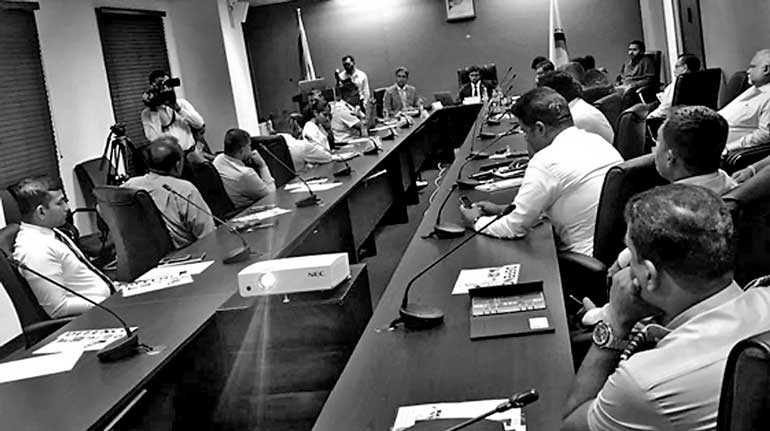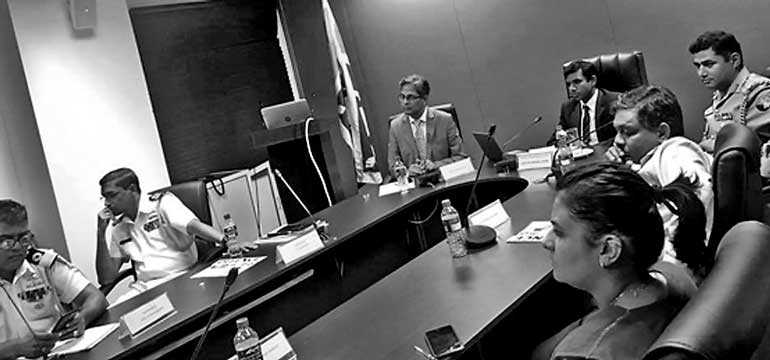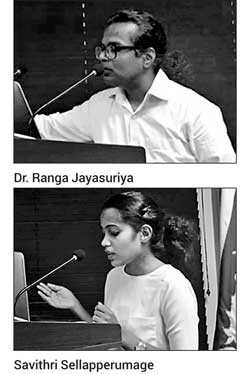Thursday Feb 19, 2026
Thursday Feb 19, 2026
Saturday, 1 December 2018 00:44 - - {{hitsCtrl.values.hits}}


A round table discussion under the theme ‘OBOR in South Asia: Trade, Culture and Security’ concluded on 15 November at the INSSSL premises. Professor Swaran Singh from Jawaharlal Nehru University in New Delhi, Dr. Priyanga Dunusinghe from University of Colombo, Commodore DMLA Dissanayake from Sri Lankan Navy, Commodore Y.N. Jayaratne from Sri Lankan Navy, Ramla Wahab Salman from International Centre for Ethnic Studies, Dr. Ranga Jayasuriya, Kasuni Ranasinghe and Savithri Sellapperumage from INSSSL were engaged as panellists and the discussion was moderated by Director General Asanga Abeyagoonesekera of INSSSL. The occasion was grace by the Defence Attachés and a representatives from the embassies. 
The opening remarks were delivered by the Director General Asanga Abeyagoonesekera, who discussed the status of China-Sri Lanka relationship in the context of One Belt One Road initiative. Reminding the first inaugural OBOR conference in Sri Lanka in 2014 at Lakshman Kadirgamar Institute during the regime of former president Rajapaksa, he observed the role played by Sri Lanka facilitating discussion on the topic. He noted the flux of Chines Investment in Sri Lanka under this massive project which involves around 68 countries.
The discussion commenced with the presentation by Kasuni Ranasinghe from INSSSL, who emphasised on the economic impact of OBOR in South Asia. She identified three parameters: Trade regulation, good governance and technical innovation, from which the economic impact of the said initiative could be measured. Further, a statistical analysis on the capacity of sea ports and air ports, average cost of handling a container and the average time to export was presented. She expressed her optimism towards such initiative and supported her contention based on the increasing trade in the region.
Dr. Priyanga Dunusinghe who identified OBOR as an economically viable initiative, expressed his views on ‘impact of OBOR in inter and intra trading in South Asia’. He directed the attention of the audience to few considerations unique to the said initiative given the economic realities of the region. He observed that OBOR operates on the hypothesis that supply creates its own demand, where it is believed that once infrastructure is established, the demand will be created.
Commodore DMLA Dissanayake brought in a maritime security dimension to the discussion. His presentation commenced with a brief explanation on the origins of One Belt One Road initiative and moved on to a discussion on maritime security implications of the infrastructure projects initiated by China.
Dr. Ranga Jayasuriya commenting on the geo-politics of OBOR observed that any project at regional or international level will have a geo-political dimension to it. Raising few concerns on geo-political tension concerning OBOR he opined that the primary driver of OBOR is the later support of China. Comparisons were drawn with the previous ‘going abroad’ strategy of china and he identified OBOR initiative as representing the fourth era of the said strategy. In his concluding remarks, he stated that the domestic imperatives of China is a key focus in the OBOR initiative. Commodore Y.N. Jayaratne who presented under the theme: ‘The BRI and the Strategic Security Thoughts’, commenced his discussion by comparing the OBOR initiative with the European recovery program. He observed that, Sri Lanka’s strategic location in close proximity with countries with massive populations has not been effectively utilised due to the inadequacy of knowledge and strategic vision on the part of decision makers.
Ramla Wahab Salman emphasised on the significance of history in understanding the OBOR initiative by China. Presenting her paper on ‘Transnational History and Heritage Along the 21st century maritime Silk Road’ she observed that it is important to “place the contemporary context of the Belt and Road initiative and understanding China’s role in pre-modern, pre-industrial, cosmopolitanism”. Bringing in a historical perspective to the discussion she identified the historical links between countries which engaged in the maritime silk route.
Savithri Sellaperumage drew the attention of the audience to research and development as a source of projecting and creating power in OBOR initiative and identified the trend of China increasingly investing on research and development. Observing we live in an age of information, she noted that “apart from having access to information it is necessary to use this information effectively and create value out of it and cause positive change”. She recognised the necessity of Research and Development to boost the economies and the overall advancement of the nations engaging in OBOR initiative.
Professor Swaran Singh highlighted the unavoidable intervention of politics in the learning processes of OBOR. He observed that despite its lucrative outlook, the implementation of OBOR has been problematic. In support of this contention he points to the looming trade deficit of the countries involved in the OBOR which has posed a formidable challenge in the implementation of such initiative. Attributing such deficit to the unilateral nature of trading relationships within OBOR, he noted that “states cannot grow in one sided trade relationships and they usually grow in balanced economic relationships”.
Further, he observed, it is important that South Asian countries provide feedback to China based on their experience and engagement in OBOR initiative.
(Prepared by Saanaaree Manoratne, Research Assistant INSSSL.)